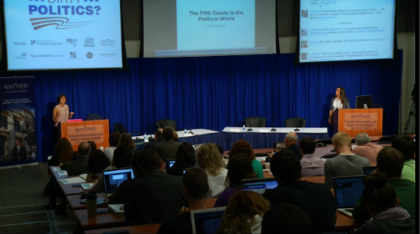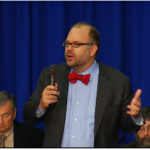Blog:
Philosophy and practicalities: Can shared best practices free political coverage from “attack ads and pack journalism?”

Kelly McBride (left) and Ellyn Angeletti, both with Poynter, share major developments and ethical pitfalls in the last decade of political coverage with participants of the 2012 Poynter Kent State media ethics workshop. Credit: Kent State University

Conversations on the JA about social accountability and trading anonymity for access to powerful sources opened up two of the many timely ethical issues that come up in political coverage. These are part of a collaboration with Kent State University that grows out of the 2012 Poynter Kent State media ethics workshop, which this year highlighted the “dirty politics” of “blistering sound bites, attack ads and pack journalism.” The ideas and examples to improve coverage that are shared in these conversations will be distilled into a new best practices guide. Here are highlights from the first two discussions in the conversation series.
Social accountability
In the first conversation in this series, social accountability meant being accountable for your reporting, in your community, even as social media blurs the line between personal and professional worlds.
There is a lot of ground a best practices guide can cover! Here are some highlights from what’s been shared so far.
The big issue is how transparent to be.
Jacob Caggiano, (full disclosure, he has done some freelancing for the JA) pushed the conversation furthest, asking, in response to comments by Ellyn Angelotti of Poynter on transparency guidelines:
Any thoughts on fostering an audience culture of “well I may not agree with that reporter’s personal beliefs, but I trust that they are contributing to a better collective foundation of facts, of which to draw those beliefs upon.” (Obviously journalists need to somehow prove that they have integrity in order to achieve this)”
Looks like at least three issues worth exploring for best practices guidelines.
- What are smart transparency practices and what are smart limits?
- How can journalists “prove they have integrity?” To whom?
- How can political reporting change the audience culture – with the overall goal of getting political coverage increasingly useful in helping voters get information? Should it?
There is plenty of room for practical guidelines, and some resources already available to review.
Kent State professor (and ethics workshop organizer) Jan Leach came up with three quick questions, with a hat tip to a Poynter guide, to ask yourself before you tweet news. David Craig, media ethics scholar and associate dean at the University of Oklahoma collected many more from his students. Other areas that could use practical guidelines:
- How do you “get ready to handle” online, viral criticism?
- In data visualizations, should you highlight nuance and multiple interpretations, or find a story and tell that? George Schwarz, in another conversation, pointed to this thoughtful piece about nuance.
- And what are best arguments on different sides for sourcing as you scrape the web for information and other reports?
Managing “access journalism”
Getting somewhere new
The 2012 Poynter Kent State media ethics workshop was a rich day to experience firsthand. These subsequent online discussions create a place to deepen and broaden the exchange of ideas that began there. They are stepping stones to getting somewhere new. After two weeks with live conversation windows and active curation, the threads will remain open to community discussion. Ultimately, participants help inform a new ethics best practices guide for political coverage, guided into creation by Kent State’s Jan Leach.
USA Today Washington enterprise reporter Gregory Korte summed up the basic tension that led to this conversation: How much control is too much to give up to a source, in a real world of deadlines and assignments?
He also identified the potential benefits of working out best practices for widespread adoption:
Every time I push back hard — not just about quote approval, but also backgrounders, e-mailed statements, etc. — I’m told, “Well, I deal with reporters all the time, and no one else has a problem with it.” It might be like plugging the levee after the waters have broken, but every sandbag helps.”
Some potential solutions that came up in the conversation:
- Figure out a way to do the story that doesn’t require negotiating quotes with sources.
- Use the question of public significance as a guide.
- Don’t negotiate and don’t back down.
- Take the person’s position into account.
- If you do negotiate with a source, reveal, reveal, reveal!
Poynter’s Kelly McBride wrote (years ago) this list of questions to ask before agreeing to go off the record. It’s an excellent place to begin for all sorts of source negotiation issues.
This week: keeping politicians honest and improving the system.










Weigh In: Remember to refresh often to see latest comments!
0 comments so far.